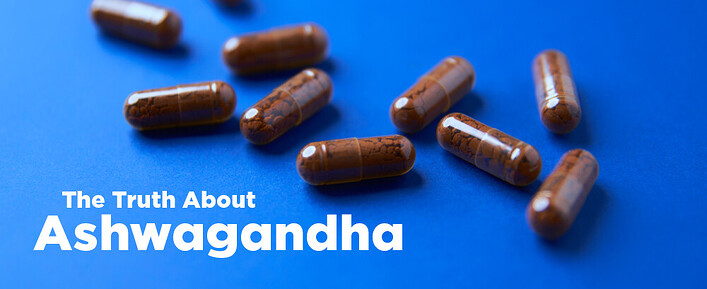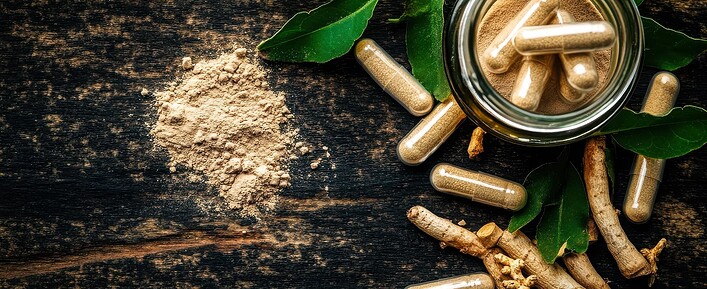The Truth About Ashwagandha
They say it reduces stress, boosts testosterone, and more. Does it? Here's the real science.
When podcasters and influencers all start talking about the same ingredient, one of two things is usually happening: 1) They're being paid, or 2) the ingredient is worth talking about and the science looks promising.
Over the last couple of years, you've heard a lot of buzz about ashwagandha, an adaptogenic herb in traditional Ayurvedic medicine. What are the claims? Does it work? Let's find out.
Ashwagandha: The Claims
Sellers of ashwagandha supplements make a wide variety of claims about the adaptogen:
- Stress reducer, mood enhancer, depression fighter
- Testosterone and fertility booster
- Physical performance enhancer
- Cognitive enhancer
- Sleep aid
- Immune system supporter
- Hormone balancer
- Anti-inflammatory, antioxidant
- Weight reducer
- Sexual health booster
That long list of claims raises eyebrows and sets off the "too good to be true" alarm bells. However, other ingredients, like resveratrol and curcumin, also have wide-ranging effects and science backs them up. So, we can't discount ashwagandha just because the health claims are diverse.
How Does It Supposedly Do All That?
Ashwagandha's health benefits are mostly attributed to its active compounds called withanolides – naturally occurring steroidal lactones found primarily in nightshades.
Withanolides interact with various cellular pathways, including stress response pathways, inflammatory cascades, and hormonal regulation systems. They can modulate cortisol levels, influence neurotransmitters, and improve cellular resilience to damage.
Does It Actually Work?
A study in Nutrients examined the effects of liposomal ashwagandha on cognitive function and mood in healthy young adults. After 30 days, the participants displayed improved memory, attention, and executive function, and reduced perceptions of tension and fatigue. Other studies show that ashwagandha seems to neutralize the toxic effects of β-amyloid associated with Alzheimer’s disease.
If we sum up several studies on ashwagandha and testosterone, there's a trend toward the herb being a mild T booster, especially in highly stressed men, men suffering from infertility, overweight men, and smokers. Very generally, their levels of luteinizing hormone, follicle-stimulating hormone, and prolactin increased, as did their sperm count and sperm motility. One study showed a 17% boost compared to placebo, but another concluded that any T-boosting effects were statistically insignificant.
For performance, when untrained men took part in an eight-week workout program, those taking ashwagandha showed slightly better improvements in muscle strength and size.
As for mood, ashwagandha has been studied for its effect on depression, bipolar disorder, anxiety, and other conditions. Generally, it worked pretty well. It seems to do this by reducing cortisol (by 23-33%) and enhancing the activity of neurotransmitters like serotonin and GABA, which help regulate mood.
What about weight loss and sleep? Ashwagandha may help indirectly by lowering stress/cortisol associated with stress eating and poor sleep. It may do this by reducing inflammation and enhancing GABA activity in the brain.
How Much to Take
This is a broad summary, but most studies use 300-600 mg of standardized extract. The high dosages are divided into two servings daily. Standardized extracts typically contain 1.5% to 10% withanolides, with 5% being a common benchmark for high-quality supplements. You can take more (5 grams) in its traditional raw form as a tea, but it's best to stick with standardized supplements.
Are there possible side effects? Yes. These include unwanted drowsiness, headaches, nausea, diarrhea, stomach upset, bloating, low blood pressure, and hypoglycemia. Also, some people are allergic to it. Ashwagandha should be avoided by those with autoimmune issues and people taking other sedatives or thyroid meds, and you should avoid using it when drinking alcohol.
Note: Denmark banned ashwagandha based on safety concerns, and other European nations are considering similar measures. However, some have criticized these bans, suggesting they may be politically and financially motivated, which is plausible.
Alternatives That Definitely Work
T Nation encourages educated self-experimentation, and ashwagandha is worth trying. Future large-scale studies will tell us more, but feel free to play around with it. (Just beware of the placebo effect.)
Also, remember that certain nutritional deficiencies are strongly associated with many of the problems people interested in ashwagandha are trying to remedy. It's always wise to take care of these deficiencies first.
For example, a deficiency in omega-3 fatty acids can contribute to mood issues, cognitive dysfunction, hormonal problems, and poor sleep. It's estimated that 90% of Americans don't meet the recommended intake of EPA and DHA. Ashwagandha isn't going to do much for you if you have this deficiency.
To prevent and correct it, use fish oil. Take 4200 mg daily, preferably with a DHA-heavy formula. Flameout DHA-Rich Fish Oil (Buy at Amazon) fits the bill.
Also, while ashwagandha seems to mildly boost testosterone in unhealthy men, other natural compounds boost testosterone more effectively in everyone. One of those compounds is Longjack (Eurycoma longifolia or Tongkat Ali). For T boosting, it's a better choice. The most bioavailable LJ100 form is found in Omega-Man High Absorption Longjack (Buy at Amazon).
Reference
- Mikulska, et al. "Ashwagandha (Withania somnifera) – Current Research on the Health-Promoting Activities: A Narrative Review." Pharmaceutics 2023, 15(4), 1057.




